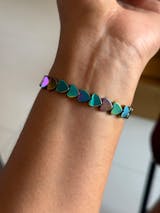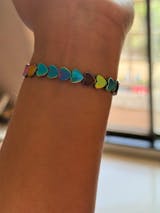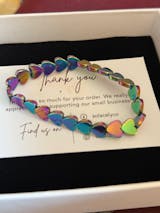Understanding Menopausal Symptoms
Menopause is a natural biological process that every woman experiences as she ages. This stage is marked by the cessation of menstrual periods and the end of reproductive years. While menopause is a normal part of life, it often comes with a variety of symptoms that can affect a woman's quality of life. These symptoms can be divided into two categories: physical changes and emotional challenges.
Physical Changes During Menopause
Approximately 70% of women approaching menopause are affected by symptoms such as hot flashes, night sweats, and irregular periods due to changing hormonal levels in the female reproductive system. These symptoms can begin in a woman's early 40s and the menopausal transition can last until her mid 50s, with symptoms possibly extending for the rest of her life.
Other physical symptoms of menopause can include weight gain, thinning hair, dry skin, and sleep problems. It's also common for women to experience changes in their sexual health, such as decreased libido and vaginal dryness.
Given the physical discomfort associated with these symptoms, many women seek out natural remedies to ease their discomfort. This is where the use of healing crystals comes in. For instance, moonstone is particularly mentioned for its association with balancing hormones, relieving stress, and soothing emotional instability during menopause.
Emotional Challenges During Menopause
In addition to the physical changes, menopause can also bring about emotional challenges. Mood swings, irritability, feelings of sadness, and bouts of anxiety and depression are not uncommon during this stage of life.
Rose quartz, known for promoting self-love and compassion, can be beneficial in enhancing mood, reducing irritation, and fostering forgiveness during the menopausal phase. Sunstone is also indicated as a crystal that can assist in countering lethargy, stimulating vitality, and reviving the zest for life in menopausal individuals.
Understanding these changes and challenges can help women better navigate this important life stage. The long-term challenging symptoms of menopause are being talked about, understood, and managed more effectively, thanks in part to figures like Davina McCall, aiming to help women navigate this transitional phase with support from tools like crystals and essential oil.
Crystals, along with other natural remedies, can be powerful tools in managing menopausal symptoms. Whether used alone or as part of a holistic approach that includes diet, exercise, and other therapies, they offer a gentle, non-invasive way to support overall well-being during menopause.
Crystals for Menopause
The use of crystals as a form of holistic therapy for various ailments has been practiced for centuries. Among the many uses, crystals are potentially beneficial in managing menopausal symptoms.
Overview of Crystals for Menopause
Menopause often brings a wave of physical and emotional changes that can be quite challenging. While there are many approaches to managing these changes, from Hormone Replacement Therapy (HRT) to holistic therapies, the use of crystals for menopause is gaining attention. Different crystals are believed to resonate with various energies in the body, potentially offering relief from some menopausal symptoms.
For example, the menopause crystal set from The Holistic Hamper includes six quality tumble stones of Citrine, Lapis Lazuli, Hematite, Carnelian, Amethyst, and Moonstone. Each crystal is believed to help calm the unpleasant changes women experience during menopause.
Specific Crystals and Their Benefits
Here are some specific crystals that are commonly used in managing menopausal symptoms:
- Moonstone: This crystal is reported to help balance hormones and relieve stress, making it particularly helpful for emotional and hormonal support during menopause.
- Black Cohosh: Known for its positive effects on hormonal balance, Black Cohosh can help alleviate menopause symptoms such as hot flashes, night sweats, and mood swings.
- Lepidolite: A form of mica containing lithium, Lepidolite is a soothing crystal that can help reduce stress and anxiety, common symptoms during menopause. It promotes emotional healing and balance.
- Labradorite: This crystal can help in relieving stress and anxiety, enhancing intuition, and balancing hormones. It can provide support during the emotional ups and downs of menopause.
- Carnelian: Known for its ability to stimulate the reproductive system and balance hormones, Carnelian can help boost vitality and address issues related to menopause.
While the scientific evidence supporting crystal therapy is limited and more research is needed, many people continue to explore this approach as part of their overall strategy for managing menopausal symptoms. As with any complementary therapy, it's important to use crystals in conjunction with, and not as a replacement for, conventional medical treatments. Always consult with a healthcare provider before starting any new treatment regimen.
Complementary Therapies for Menopause
While crystals for menopause can be a powerful tool for managing symptoms, they are often most effective when used in conjunction with other complementary therapies. Two such therapies that are often recommended for managing menopause symptoms include essential oils and hormone therapy.
Essential Oils and Menopause
Essential oils have been used for centuries to alleviate physical and emotional symptoms associated with various conditions, including menopause. Certain oils, such as Clary Sage Essential Oil and Sandalwood 5% Essential Oil, are particularly beneficial for menopause symptoms like exhaustion, insomnia, depression, muscle relaxation, negativity, stress, fear, irritability, sensitivity, and worry.
| Essential Oil | Benefits |
| Clary Sage Essential Oil | Alleviates exhaustion, insomnia, depression, muscle relaxation, negativity, and stress |
| Sandalwood 5% Essential Oil | Eases fear, irritability, sensitivity, and worry, and promotes self-expression |
These essential oils can be used in various ways, such as a massage oil or in an oil burner, to provide additional benefits during the menopausal years. When combined with the use of crystals for menopause, essential oils can offer an integrative approach to managing menopause symptoms.
Hormone Therapy for Menopause
Hormone therapy is another complementary approach that can provide relief from menopausal symptoms. Menopausal hormone therapy can alleviate hot flashes, vaginal symptoms, and urinary symptoms. Additionally, it may provide other health benefits like reducing bone loss and the risk of a fracture, and improving heart health.
However, it's important to note that hormone therapy is not without risks. For example, combined hormone therapy can increase the risk of developing breast cancer. Therefore, understanding the risks and benefits is essential before deciding to undergo hormone therapy.
Whether you choose to use essential oils, hormone therapy, or a combination of these with crystals for menopause, remember that each person's experience with menopause is unique. It's important to find a treatment plan that works best for your individual needs and symptoms. Always consult with a healthcare provider before starting any new treatment regimen.
Using Crystals for Menopause
Incorporating crystals into your daily routine can be a powerful tool to alleviate various symptoms during menopause. To get the most out of your crystals, it's important to understand how to effectively use them and adapt the crystal therapy to meet your personal needs.
How to Use Crystals
Crystals can be used in several ways to harness their healing properties. Here are some common methods:
- Carry in Your Pocket or Purse: Simply carrying your chosen crystals with you allows their energy to interact with yours throughout the day.
- Wear as Jewelry: Wearing crystals as necklaces, bracelets, or earrings can be a stylish and effective way to benefit from their healing properties.
- Place Under Your Pillow: For crystals known to aid with sleep disturbances, such as Amethyst, placing them under your pillow can promote a restful night's sleep.
- Meditate with Crystals: Holding your chosen crystal during meditation can enhance your practice and deepen your connection with the crystal's energy.
Adapting Crystal Therapy to Personal Needs
Different crystals have different properties, and it's vital to choose the ones that align with your specific needs during menopause. Here are some beneficial crystals for menopause and their properties:
- Moonstone helps to balance hormones and relieve stress, providing emotional and hormonal support during menopause.
- Black Cohosh has positive effects on hormonal balance, helping to alleviate menopause symptoms such as hot flashes, night sweats, and mood swings.
- Lepidolite can help to reduce stress and anxiety, promoting emotional healing and balance.
- Labradorite helps relieve stress and anxiety, enhances intuition, and balances hormones, providing support during the emotional changes of menopause.
- Carnelian can boost vitality and address issues related to menopause by stimulating the reproductive system and balancing hormones.
- Amethyst can be beneficial for combating insomnia and stress relief during menopause. It is also suggested that a crystal combining Citrine and Amethyst, such as Ametrine, can help balance the body and provide cooling and soothing effects.
- Citrine can assist in controlling hot flashes, balancing yin and yang, and enhancing the energy flow between the Sacral, Solar-Plexus, and Third-Eye Chakras, thereby ameliorating menopausal symptoms. Additionally, Citrine is believed to aid in digestion.
- Lapis Lazuli is recommended for managing insomnia and providing mental and physical smooth transitions during menopause. This crystal is known for its soothing properties and ability to balance hormonal and menstrual cycles.
Adapting your crystal therapy to your personal needs involves selecting the crystals that resonate with your symptoms and incorporating them into your daily routine. Remember, everyone's experience with menopause is unique, so it may take some experimentation to find the crystals and methods that work best for you.
Shopping for Menopausal Crystals
In the journey to manage menopause symptoms, selecting the right crystals is an important step. Quality, type, and form are among the key considerations when shopping for menopausal crystals.
Selecting Quality Crystals
When selecting crystals for menopause, one must consider the quality of the stones. High-quality crystals offer more potent benefits. Solacely offers six quality tumble stones of Citrine, Lapis Lazuli, Hematite, Carnelian, Amethyst, and Moonstone, each believed to help calm the unpleasant changes experienced during menopause.
The crystals in this set have their unique benefits. For instance, Amethyst can combat insomnia and provide stress relief, Carnelian can energize and provide relief from depression, Citrine can assist in controlling hot flashes and aid digestion, and Lapis Lazuli can manage insomnia while providing smooth mental and physical transitions during menopause.
Considerations for Crystal Sets and Bracelets
While crystal sets are a popular choice for those exploring crystal therapy, there are other ways to benefit from the healing properties of crystals. For those who prefer to wear their crystals, a menopause crystal bracelet is a great alternative.
Solacely offers a handmade-to-fit menopause crystal bracelet. This provides another way to benefit from the healing properties of the stones beyond traditional crystal therapy.
Furthermore, customers have the option to purchase both the menopause crystal set and the bracelet together at a special discount. This allows individuals to benefit from both the crystal set and the bracelet, enhancing their healing journey during menopause.
Whether you choose a crystal set or a bracelet, it's important to remember that these are not standalone solutions. They are complementary therapies that can support traditional treatments for managing menopause symptoms. For instance, the menopause crystal set also comes with a guide to essential oils that can provide further benefits during menopause.
In the end, the most critical factor is to choose crystals that resonate with you and adapt your crystal therapy to your personal needs and preferences. Whether you're considering crystals for menopause or other purposes such as crystals for focus, crystals for overthinking, or crystals for positivity and happiness, ensuring that you're drawn to the crystals you select can enhance their potential benefits.
The Science Behind Crystals
In the world of holistic healing, crystals are viewed as powerful tools for restoring balance and alleviating various health conditions, including menopausal symptoms. However, understanding the science behind how these crystals interact with our energy fields and the limitations of their use is crucial.
How Crystals Interact with Energy Fields
Crystals are believed to work by interacting with the body's energy field, helping restore balance and harmony. This interaction is thought to contribute to the alleviation of menopausal symptoms as part of holistic healing practices.
For instance, Lapis Lazuli is recommended for managing insomnia and providing mental and physical smooth transitions during menopause. This crystal is known for its soothing properties and ability to balance hormonal and menstrual cycles.
However, the mechanisms of how crystals interact with the energy field are still a topic of ongoing research and discussion within the scientific community.
Limitations and Further Research on Crystal Therapy
While many individuals find comfort and relief in using crystals for menopause, it's essential to consider the limitations of this approach. One study noted that the efficacy of phytoestrogens in reducing the overall symptoms measured by the Kupperman index was not significant compared to a placebo, suggesting more research is needed to establish the utility of phytoestrogens in alleviating menopausal symptoms.
This implies that, while some may find relief through the use of crystals, they may not work for everyone. It is always recommended to use these holistic methods in conjunction with, and not as a replacement for, traditional medical treatments.
Also, keep in mind that the holistic approaches including the menopause crystal set and essential oils, aim to help manage the long-term challenging symptoms of menopause, providing support and care for women to navigate this stage of life with more ease and comfort.
For further reading, consider exploring information on crystals for kids, crystals for action, crystals for focus, or crystals for overthinking.














